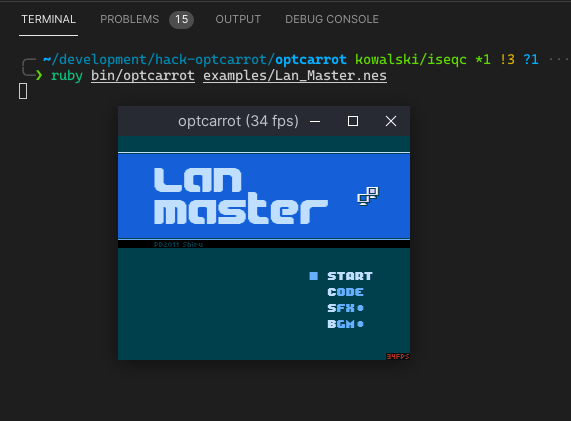One of the most frequently used core APIs in Ruby is Kernel#require. It's to resolve the path of another Ruby file, read it. And since Ruby 1.9, the default runtime for Ruby is YARV which operates on bytecode, Kernel#require will then compile the source into bytecode and eval it.
Before this year Google Summer of Code, I found that on Ruby 3, Kernel#require is a bit slower than another similar API Kernel#require_relative. And after discussing with my community mentor, the inventor of YARV, Koichi Sasada, we decided to finding a way to improve overall speed of current loading mechanism.
Before writing the code, we had to figure out Ruby's performance profile. There're several profiling tools like perf, gprof and binary instrumentation tools like valgrind. But they could not meet our demand. perf and gprof are sampling-based and the part we needed to measure is too tiny to be recorded. valgrind takes too much memory and runs really slow.
We needed to know C function level behavior and performance of Ruby. So my mentor advised me to write a new event-based profiling tool for the interpreter. We are inspired by chrome://tracing tool and made most work done based on it.
The profiling tool has 4 parts:
- An event list to record runtime events
- An event stack to simulate the native call stack and handle long jumps
- An event serializer to generate the JSON file
- An initializer and a cleaner to setup and finalize the whole process
And there're a few difficulties to overcome:
- Minimize profiling overhead
- Support running in parallel
- Handle Ruby's exceptions and long jumps
For 1 and 2, I hook Ractor creation and initialize per-ractor heap memory in advance.
For 3, I hook Ruby's internal exception handler.
Here's a simple example on how to use it
// In event_profiling.h
#define USE_EVENT_PROFILING 1
// In array.c
#include "event_profiling.h"
static VALUE
rb_ary_collect(VALUE ary)
{
RB_EVENT_PROFILING_BEGIN_DEFAULT(); // Begin Event
long i;
VALUE collect;
RETURN_SIZED_ENUMERATOR(ary, 0, 0, ary_enum_length);
collect = rb_ary_new2(RARRAY_LEN(ary));
for (i = 0; i < RARRAY_LEN(ary); i++) {
RB_EVENT_PROFILING_SNAPSHOT("snapshot here"); // Snapshot Event
rb_ary_push(collect, rb_yield(RARRAY_AREF(ary, i)));
}
RB_EVENT_PROFILING_END_DEFAULT(); // End Event
return collect;
}And load event_profiling_out.json in chrome://tracing
With our new tool, we can illustrate a figure for Kernel#require on a 10000 line def
def large_def
puts 1
puts 2
...
puts 10_000
endThis is generated from kernel_require.json.
Loading the file(rb_parser_load_file) and compilation(rb_iseq_new_top) occupy most time of the whole loading process.
Other than using for this GSoC project, I've made it able to profile multiple Ractors and possible to analyze GC behavior.
This is a very early and experimental Ruby Gem used to pre-compile YARV Instruction Sequence and do fast loading.
There're some other mature projects like ko1/yomikomu and Shopify/bootsnap. We do not want to reinvent it but make something different.
Bootsnap enhanced Ruby interpreter's YARV Instruction Sequence(iseq) loading mechanism with C extension, making it possible to cache iseq in local directories indexed by file name hash.
Other than caching, we have larger goals:
- Pre-compilation iseq
- Link iseqs from different sources into a single binary file
- Reorder the binary and eliminate duplicate parts
- Use
mmapto load, sharing one iseq binary between different Ruby interpreter processes
I've crafted a very simple version without iseq binary reordering but the benchmark can tell it does help. (See GitHub for the file format and how to benchmark: DarkKowalski/Iseqc)
I prepared 3 cases for the benchmark(See cases):
- 10000 line
defx 10 - 10000 line
classx 10 - 1kb literal
Stringx 10
Run all cases 100 times and measure the performance with Benchmark#bmbm
user system total real
Kernel#require 0.001596 0.000000 0.001596 ( 0.001600) baseline
Bootsnap#require 0.000092 0.000000 0.000092 ( 0.000091)
Iseqc#require_iseq 0.000268 0.000000 0.000268 ( 0.000268) 5 times faster
Kernel#load 21.070341 0.183137 21.253478 ( 21.273447) baseline
Bootsnap#load 1.253958 0.076384 1.330342 ( 1.336012)
Iseqc#load_iseq 1.223862 0.000000 1.223862 ( 1.224858) 16 times faster
It's currently slower than bootsnap on require but we should be able to overcome it once we replace more Ruby code with C extension.
I have tested Iseqc on this modified optcarrot.
This pack.rb will compile and link all .rb files under the lib directory and outputs a optcarrot.rpk
require 'iseqc'
Iseqc::Pack.pack('optcarrot.rpk', 'lib')Then we can use such code to load files from it
module Optcarrot
PKG = Iseqc::Unpack.unpack('optcarrot.rpk')
end
Optcarrot::PKG.require "optcarrot/nes.rb.rbc"There're still some unfinished work:
- Analyze the linked iseq binary and apply optimizations
- Support memory sharing between processes
I can support memory sharing later but need more time to find a way to optimize the iseq binary.
And other features we could consider:
- Support
require 'file', from: 'package'inKernelmodule - Support distinguishing internal
require_relativeinside a package
For this year Google Summer of Code, we tried to analyze and improve the overall performance of Ruby current loading mechanism Kernel#require.
We made a new event-based profiling tool that helps us to know more runtime performance details of Ruby. And Ruby maintainers are going to merge it as a debugging/profiling facility.
We had a try at pre-compile -> link(possible to apply reordering and optimization) -> load with mmap approach to improve the performance. The benchmark can tell it does help.
For now it's not that clear how to apply link time optimization and reordering for YARV Instruction Sequence. But it's a nice idea and I'd like to spend more time on it after this GSoC.
Thank Ruby community mentors, especially Koichi Sasada(ko1) who helped me a lot. And thank Google for this great Summer of Code.

